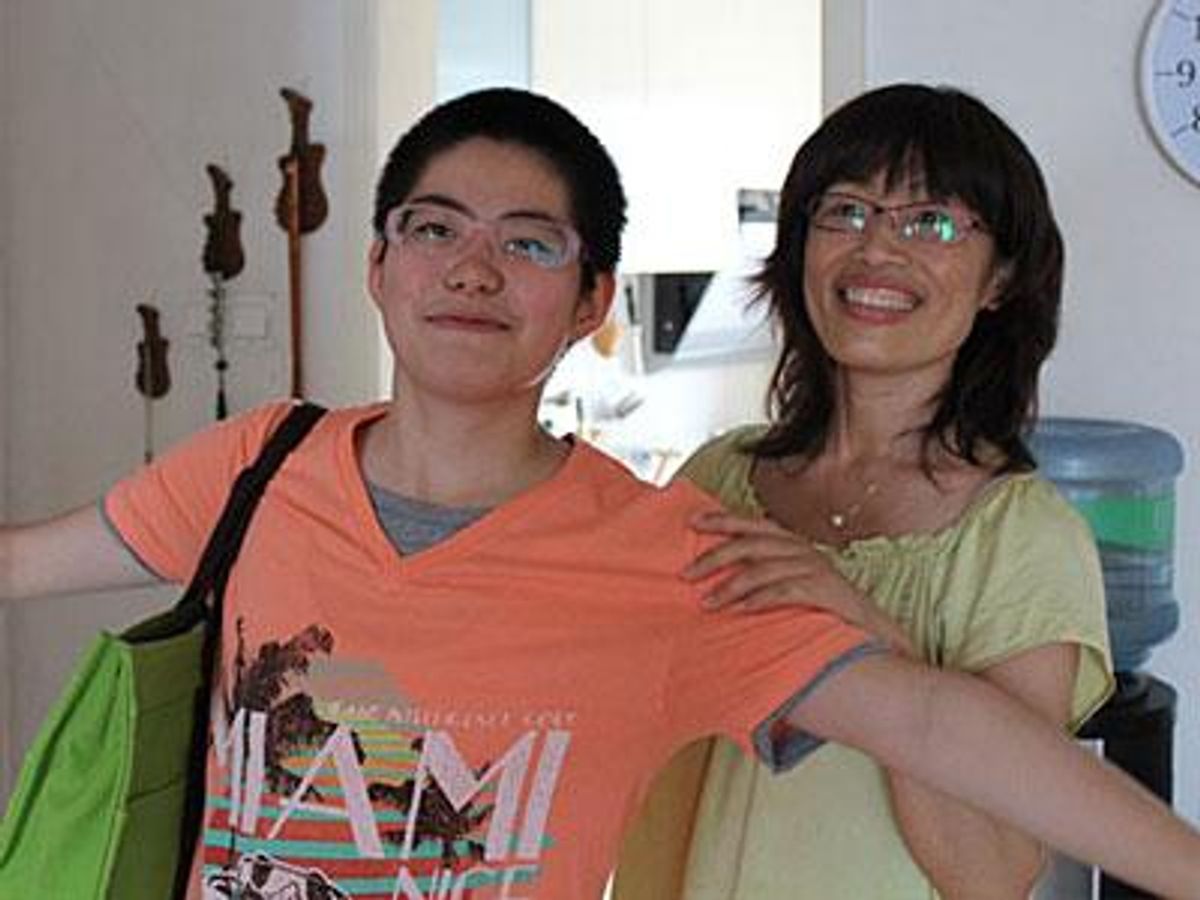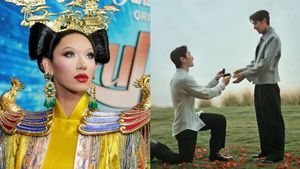In 2006, Ang Lee made history as the first person of Asian descent to win an Oscar for Best Director. The world watched as Lee, a Taiwanese-American, dedicated his critically acclaimed film Brokeback Mountain to its two protagonists, Jack and Ennis.
"They taught all of us who made Brokeback Mountain so much about not just all gay men and women whose love is denied by society, but just as important, the greatness of love itself," Lee said. "Thank you."
The people of China -- the nation from which Lee's homeland broke away -- watched him accept one of the highest honors in the film industry. But they did not hear these words, because his speech was censored in advance by the Chinese government.
In China, positive media depictions of LGBT characters are against the law, which means that a film like Brokeback Mountain -- telling the story ofa clandestine romance between two men in the American West -- would never be able to screen legally in the world's most populous country. The government has a complex security apparatus that is designed to censor any content that could be considered subversive, a term that applies to LGBT people, their leaders, and their movement for equality.
This censorship presents a serious obstacle for LGBT people in China and those hoping to reach them. How does one effect change in an environment like China's, which is designed to suppress dissent, where pride parades are illegal and newspapers are prohibited from reporting on LGBT issues? How can Jack and Ennis change the hearts and minds of the Chinese if their story remains untold?
For a new generation of activists who are savvy in social media and word-of-mouth rallying, the solution is to go underground. Defying ongoing censorship and other obstacles from police and government officials, activists are beginning to form a network reminiscent of the U.S. pre-Stonewall era that has succeeded in moving the needle toward acceptance within the past few years. Film and its postive depictions of LGBT characters may be at the heart of this movement. The story of queer film in China, the artists involved in it, and its success despite the odds reflects the country's ongoing struggle toward equality.
Popo Fan is the director of the Beijing Queer Film Festival. While it may not be the oldest of its kind, the festival, established in 2001, is the longest-running in China, says the fresh-faced filmmaker in a recent interview with The Advocate. At 27, Fan looks like he's barely out of school. He carries a backpack that is filled with DVDs, pamphlets, and pins related to his work with the festival. He has traveled to Los Angeles to attend Outfest, one of the most prominent LGBT film festivals in the United States, where one of his documentaries has been chosen to screen. Through an IndieGoGo campaign, Fan succeeded in raising the funds required to bring him to the United States for this trip. So how does he manage to run his own queer film festival in China?
"We have a plan A and a plan B and a plan C and a plan D," Fan says.
Over 13 years the festival has evolved through six editions, screened in countless locations, and seen many organizers in order to survive. It has been subject to police raids, arrests, warnings, and government spies, with many attempts to permanently end this annual display of LGBT pride. Its venues have ranged from gay bars to foreign embassies to an ally's basement, where a white sheet served as a screen.
The festival was originally conceived by students at Peking University, who christened it the Tongzhi Film Festival. In Chinese, "tongzhi" translates to "comrade" in the Communist sense, which is how the students gained approval from the university to host the event. However, "tongzhi" is also a slang word for people who identify as LGBT, which served as an insider advertisement for its intended audience. The festival went on largely as planned but was shut down during its last day, when school officials discovered the ruse.
For several years, the festival remained dormant, due to the students' fear of more serious repercussions. After a second attempt to stage the festival at Peking University failed, organizers moved the location to 798 Art Zone, an artistic community in the Chaoyang District of Beijing that is populated with former military factories -- large hangars perfect for art galleries and, with the right equipment, movie screenings.

Pictured: A film screening and panel discussion at Tsinghua University
The festival survived at 798 for two years, at which point Fan, who was first an audience member, volunteered to become an organizer. He made an impact immediately. After heightened police scrutiny, Fan helped to move the festival to a rural location nearly two hours from Beijing. Its remote venue helped protect the festival, since surveillance of LGBT organizations and events is highest in urban areas. But even in this secluded place, police discovered the location in 2011, which forced Fan to once again transplant the festival back to Beijing. Throughout the years, he's learned how to "play the game of cat and mouse," staying one step ahead of authorities while orchestrating an ever-changing and underground festival that is hosted in secret venues throughout the city. As actress Lucille Ball once said, "A moving target is hard to hit."
This year the five-day festival screened 28 films from nine countries, including Fan's documentary Mama Rainbow, which follows six mothers ("one for each color of the rainbow flag," he says) as they forge relationships with their gay and lesbian children. The moving documentary, which illustrates a growing PFLAG-style movement across China, was shown in a bus as it rolled across the streets of Beijing.
"I travel a lot," Fan says, with a gleam in his eye. "I watched a film on a flight, and I had this idea, 'Oh, well, we can't rent a plane, but we can rent a bus.'"
In addition to being a moving picture show, the bus also served as a tour for initiates, stopping at different locations that have housed the festival throughout its more than decade-long history. The experience is an eye-opener for first-time audience members, who are accustomed to a lifetime of media censorship regarding LGBT issues. One of Fan's many duties is fund-raising, and he uses part of these funds to host an annual lottery that will pay for the transportation and lodging for 25 lucky winners from more rural areas of China who will then be able to travel to Beijing and experience LGBT films -- many for the first time.
And for many, the festival is more than just about film. Fan recalls meeting one former audience member who fell in love with her partner during the festival. Afterward, she was inspired to pursue a degree in gender studies at the University of Hong Kong, where she examines a cultural practice called "form" marriage, a common practice in China in which a gay man and a lesbian will marry one another in order to appease their families.
"This film festival is a home for us," she told Fan.
Unlike traditional film festivals, the Beijing Queer Film Festival does not impose strict standards of entry or award accolades. It functions more as a refuge for LGBT people, their ideas, and their artistic expression. It is one arm of the growing pride movement in China, though its size is limited by its inability to advertise.
"We can't do that much promotion," says Fan, who estimates that audience size at screenings range from 30 to 115.
In addition to the bus, the Beijing Queer Film Festival also relies on collaborations with foreign embassies, including the French embassy, the Dutch embassy, and the Beijing American Center, which, being foreign soil, are safe from police intrusion.
According to Fan, police "just want to scare you," preferring to close the venue and disperse the crowd rather than arrest the audience members. However, he recalls incidents in which officers would attempt to record the identifies of participants or even take photographs of their faces with a cell phone. They will use this information to keep tabs on LGBT people or even reveal their sexual orientation to family members. And arrests do occur. Fan remembers one filmmaker who was kept in a police station for several weeks. During this time, he spent his days lecturing to the officers on duty, providing them with lessons about LGBT issues.
Happily, this year's film festival concluded without incident. A press release, disseminated after the festival's closing June 23, announced that this is the first year that the police had not interfered with the proceedings. Thanks to word of mouth and established networks, nearly every screening was at full capacity.
To broaden the festival's reach, Fan also launched the China Queer Film Festival Tour in 2008 along with LGBT activist Bin Xu and actress Shi Tou, who starred in Fish and Elephant, one of the first mainstream Chinese films to feature lesbian characters. Throughout the year, Fan travels to different cities, helping to screen LGBT films at venues that range from private salons to an occasional university. He also stages Q&As and panels that are designed to help educate audience members, many of whom are straight, on LGBT issues.

Pictured: PFLAG-China mothers greet the crowd at a screening of Mama Rainbow.
Fan learned the art of moviemaking at the Beijing Film Academy, and not for reasons one might suspect. "I studied film because I was very bad at math in high school," he says, laughing. At the time of the interview, he wears a T-shirt inscribed with Chinese characters. Translation? "We want to watch homosexual movies!" Actress Tilda Swinton, known for her international activism on LGBT issues, has been photographed wearing Fan's shirt.
At school Fan learned the power of his craft when he began viewing queer films with a classmate he perceived as homophobic. After several of these viewings, Fan noticed that his classmate's attitudes about LGBT people became more positive and informed. "Film can change people's minds," Fan says with certainty.
After attempting to find a book about queer film in China and realizing one did not exist, Fan wrote Happy Together: Complete Record of 100 Queer Films, with the assistance of professor Cui Zi'en, who has since been fired from the Academy for being gay. Fan had also asked for assistance from a boyfriend at the time, who worked at a publishing company. But he declined, fearing the consequences of coming out at work.
Published in 2007, the book was the first of its kind in China, a catalog of the country's gay films that calls to mind Vito Russo's The Celluloid Closet. Its sales also helped Fan establish himself as a filmmaker, enabling him to buy his first digital video camera. To date, he's created several documentaries, including The Chinese Closet, which tells young people's stories of coming out to their parents, as well as Only Love, which examines the lives of transgender people in southern China.
Another major turning point in Fan's role as an activist occurred when he gained entry to an internship program run by the Los Angeles Gay and Lesbian Center. Established in 2008, the Emerging Leaders Program was originally conceived as a skills-building program, which would serve as an incubator for talented young people.
"Its entire intent is to create a situation that empowers young activists to engage in activities that would strengthen the movement in ways no one thought was possible," Darrel Cummings, chief of staff at the center, tells The Advocate.
Thanks to the Internet, many young LGBT leaders in China have found a place to meet one another and engage in advocacy through social media. But the infrastructure that could provide this new generation with the skills they needed to advance their cause did not exist in China. To address this, the center has stepped in. Twice a year, four applicants from China are selected and brought to Los Angeles for six weeks, where they are exposed to every project and program that the center runs, including services for homeless youth, health, counseling, and HIV education. However, Cummings and Fan soon discovered that the program's value extended to far beyond education.
"What we thought what would be a skills-building program has turned into something very different," Cummings says. "When they come here, they are free of the day-to-day responsibilities they had in China. They're around colleagues from China and stimulation of all kinds. And it provides them with an opportunity to think, in the future, about what the movement in China could be and what their role would be. It's a luxury that even many people here don't have."
Through the program, Fan met another intern, Ah Qiang, who is now the executive director of PFLAG-China. Qiang collaborated with Fan to create his documentary Mama Rainbow, helping him to find mothers who would come out in support of their gay and lesbian children. The partnership illustrates the value of creating a network of leaders, something that will be crucial to advancing China's LGBT rights movement.

Pictured: Popo Fan, director of the Beijing Queer Film Festival, in red, talks to the audience on closing night.
The value of this network recently hit home for Cummings. Earlier this year the center organized a retreat for the program's graduates, which number around 40 to date, to instruct them in more advanced skills. During the retreat one of the members from China approached Cummings with a startling revelation.
"Do you realize you have 80 percentage of the LGBT leadership in this room?" he told Cummings, who realized this figure may be close to accurate.
"They don't know that they're the people that the history books are going to write about," says Cummings, who points to an AIDS walk on the Great Wall of China and a translation of Kate Bornstein's trans manifesto Gender Outlaw as other significant accomplishments of the program's graduates. "One of them is the Harvey Milk. One of them is the Barbara Gittings," he says. "They don't appreciate the sacrifice they're making. There's not one of these people who doesn't have a government dossier a foot thick. It's not like Popo is going to decide to work for the Chinese National Bank and be able to get a job. They've forfeited these kinds of opportunities, so they're even more remarkable."
The obstacles faced by this generation are daunting but not insurmountable, Cummings says. Many of them are complicated by China's strong focus on family. Honor and the necessity of procreation have cast LGBT people as rebels within their families.
"Family is a really big issue," Fan says. "In China, we think gays and lesbians can't get married because it's hard to get kids. That means, if you are gay or lesbian, then you won't pass the family name on."
"The family unit will never kick children out," says Fan, who says that homelessness among LGBT youth, a significant problem in the United States, is not a major issue in China. However, other problems emerge. "They might lock their son or daughter at home and not let him or her go out," he says, pointing to physical abuse from family members and suicide as other consequences.
Media censorship remains another constant impediment. Social media websites like YouTube and Twitter are not accessible. Facebook was blocked in 2009 after the 20th anniversary of the Tiananmen Square uprising prompted a flurry of postings that the government deemed dangerous.
"In Communism, people have the same purpose," Fan says. "They are going in the same direction. But if you promote diversity, then all the people go to different directions. Then it's not OK for the government."
This censorship is often arbitrary. A website or a film will be prohibited while a similar project will be passed over. Fan points to a British television series with gay characters that was allowed to air in China -- the rationale being that, because it a science fiction series set in space, the characters were far enough removed from Earth and humanity to not be political.
"There is no visible line because the rules are not open to the public," Fan says. "There are not even rules. There are people who censor, who say this is OK or not OK."
In this environment, is equality for China's LGBT population possible? Fan believes the government will have to undergo a systemic overhaul before such a development could take place.
"If we really want to have equal rights for the LGBT movement, we should unite in some other civil society movement together to break the whole society system. Otherwise, it's almost impossible for you to change the policy, because the government would never listen to you," Fan says. "LGBT rights won't happen separately from democracy."
Cummings, however, is more optimistic about the changes Fan and his colleagues can effect in the near future.
"Things are changing so fast in China that I think everything is on the table. What everybody said five years ago was impossible to do in China, these people have done, and then some," he says. "I would not underestimate their ability to achieve."
In the meantime, Fan is already creating his next documentary, while planning for the seventh edition of the Beijing Queer Film Festival, scheduled for 2015. The show, after all, must go on.
Below, see the trailer for Popo Fan's Mama Rainbow.





















































































